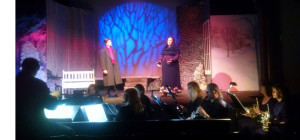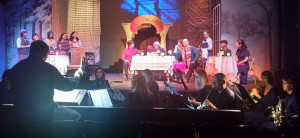“By the time (‘La Boheme’) had its premiere, Giacomo Puccini was no longer living a life of impoverished artistic struggle,” reads an article about the opera at history.com. “His previous opera, ‘Manon Gascaut,’ had made his name in the world of Italian opera and, more important, it had earned him a significant advance on his next work.
“It was, perhaps, the perfect vantage point from which to create a work that so famously romanticizes the passionate struggles of the artistic class.”
In the opera’s opening scene, near-destitute painter Marcello (Steve Zimmerman) and Rodolfo struggle to stay warm using one of Rodolfo’s manuscripts as fuel for their fire — and fodder for a procession of playful puns. Zimmerman and Flagg were well synced to each other Saturday, evoking their characters’ good-natured personalities and an obvious camaraderie.
As Rodolfo sits alone writing later that evening, Mimi knocks on his door requesting a light, as her own last candle has burnt out. Love begins to blossom as Rodolfo’s candles also lose their light and the two end up groping in the dark for Mimi’s “lost” key.
Act Two opens at a local café as Rodolfo introduces Mimi to his friends. Another of Rodolfo’s roommates (Anders Froehlich as musician Shaunard) has had a windfall and is treating them all to dinner. The wine is flowing freely and dinner is well under way when Marcello recognizes a couple strolling in. It is Musetta and her new beau, the well-to-do but much older Alcindoro (Paul Trombley).
Musetta thrives on being the center of attention, as she demonstrates with her song, “Quando me’n vo.” (“When walking alone on the streets / People stop and stare / And examine my beauty / From head to toe … And then I savor the cravings which from their eyes transpires.”) After failing to get Marcello’s attention with flirtatious glances, Musetta tricks her date into leaving on an errand and Marcello eventually succumbs to her more direct advances.
In Act Three, Rodolfo has come to realize that Mimi’s cough is more than a passing cold. At first he feigns bitter jealousy to tempt Mimi to find a wealthier suitor who can better care for her, but eventually he confesses his real reason for turning her away. The two resolve to remain together at least until the spring. Meanwhile Marcello has caught Musetta flirting with another man and has angrily ended their relationship.
 The closing act of “La Boheme” brings all of the friends together in a tragic conclusion. The final scenes in the Verismo production are acted and sung with passionate feeling, bringing out the best in the entire cast. Musical accompaniment is provided by a small orchestra, conducted Saturday by Michael Shahani; the musicians were well tuned to the action and nuanced in their accompaniment.
The closing act of “La Boheme” brings all of the friends together in a tragic conclusion. The final scenes in the Verismo production are acted and sung with passionate feeling, bringing out the best in the entire cast. Musical accompaniment is provided by a small orchestra, conducted Saturday by Michael Shahani; the musicians were well tuned to the action and nuanced in their accompaniment.
It is the goal of Verismo Opera to make opera accessible to the public at reasonable prices. Artistic director Frederick Winthrop has succeeded in bringing professional opera to Vallejo since founding the company in 1982. Dress is casual. The Bay Terrace Theatre is a relic converted from a Vallejo school house in 1967. It is a no-frills space, which by the way makes the production quality all the more impressive.
“La Boheme” is typical of a Verismo production in its quality staging, costuming, orchestral accompaniment and, most of all, accomplished singers. Opera fans and newcomers alike have good reason to see “La Boheme” — it’s a professional and heartfelt production, and it’s going on right here in our own backyard.
If You Go
“La Boheme” continues at the Bay Terrace Theatre, 51 Daniels Ave., Vallejo through Sept. 7 and moves to the Hillside Club, 2286 Cedar St., Berkeley, Sept. 13 and 14. Tickets are $12 to $25 and are available by calling 707-864-5508 or online at verismoopera.org.
Elizabeth Warnimont is a freelance writer specializing in the performing arts. She is also a substitute teacher for the Benicia Unified School District.






